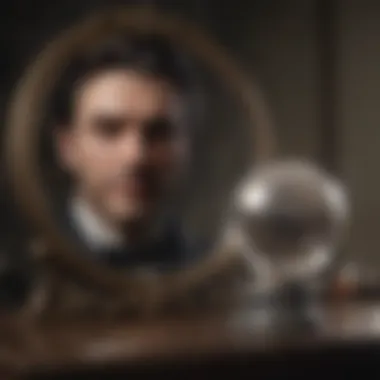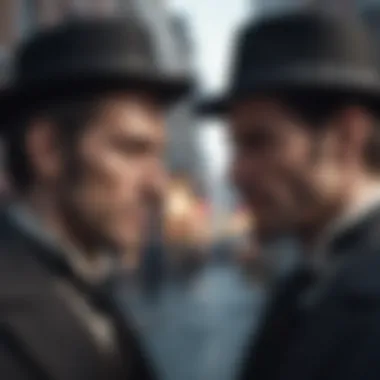Unraveling the Intricacies of Dr. Jekyll and Mr. Hyde: A Deep Dive into Dual Nature and Identity


Game Reviews
Against the backdrop of literary analysis rest the intricacies of character depiction in Robert Louis Stevenson's classic novella, striking parallels between the unfamiliar dualities in fictional architecture and that of the human psyche. Unfolding the layers of complexity within Dr. Jekyll and Mr. Hyde introduces readers to profound societal reflections rarely gleaned from a work of fiction. Each word meticulously crafted to evoke deep contemplation from the minds of avid readers and scholars, inviting a journey into the depths of morality and self-identity. The interplay of light and shadows, good and evil, mirrors the everlasting conflict within each individual.
Character Spotlights
Venturing further into the nuances of Dr. Jekyll and Mr. Hyde's characters unravels a tapestry of psychological motifs that have withstood the test of time. The introductory glimpse into their personas sets the stage for a narrative filled with moral ambiguity and introspective questioning. Delving into the backgrounds of these enigmatic figures unearths intriguing pasts intertwined with pivotal choices, showcasing the fragile balance between propriety and the darker allure of the unknown. Their abilities and skills serve as a stark reminder of the dual nature inherent in all beings, while their legacies leave an indelible mark on the tapestry of classic literature.
Game Walkthroughs
As the reader progresses through the maze of Dr. Jekyll and Mr. Hyde's tales, a roadmap emerges, guiding them through the twists and turns of their intertwined destinies. An introduction laden with anticipation propels enthusiasts towards a level-by-level exploration of the novella, uncovering hidden truths and moral conundrums along the journey. Tips and tricks abound, offering insight into the complex narrative structures meticulously woven by Stevenson. Collectibles scattered throughout the storyline serve as breadcrumbs, leading to a deeper understanding of the characters' motivations, while boss battles symbolize the ultimate confrontation between light and darkness.
Nintendo News Updates
In a realm where fiction meets reality, latest releases and updates resonate with echoes of Stevenson's timeless tale, reflecting the ongoing evolution of storytelling in the modern age. Artists and gamers alike converge in digital arenas, exchanging ideas and theories, much like the characters of Dr. Jekyll and Mr. Hyde perpetually engage in internal dialogues. Events and tournaments capture the spirit of competition, mirroring the societal pressures that mold and shape individuals. Amidst rumors and speculations, the gaming industry thrives, echoing the veins of duality that run deep within the human experience.
Introduction
Background of Dr. Jekyll and Mr. Hyde
Creation by Robert Louis Stevenson
The creation of Dr. Jekyll and Mr. Hyde by Robert Louis Stevenson stands as a cornerstone in literary history. Stevenson's innovative approach in crafting characters with contrasting personas has been a pivotal influence in the realm of psychological fiction. By intertwining the dichotomy of good and evil within a single individual, Stevenson challenges conventional morality, beckoning readers to ponder the depths of human nature. The unique fusion of scientific experimentation and moral philosophy in the creation of these characters sets a remarkable foundation for the narrative. However, some critics argue that this dual portrayal may oversimplify the complexities of the human psyche, thereby limiting the depth of character exploration within this article.
Initial reception and impact
The initial reception of Dr. Jekyll and Mr. Hyde reverberated through literary circles, sparking discussions on the nature of humanity and the consequences of unchecked desires. The novella's immediate impact on Victorian society highlighted the fragility of morality and the dangers of suppressing one's true self. Stevenson's underlying critique of societal constraints and the dark allure of hidden desires struck a chord with audiences, provoking introspection on the duality present in every individual. While the novella's success lies in its ability to captivate readers with its psychological suspense, some interpretations suggest that the stark portrayal of good and evil may lack the nuanced complexity desired for a more profound analysis within this article.
Themes and Symbolism
Duality of human nature


The theme of duality permeates the narrative of Dr. Jekyll and Mr. Hyde, exposing the internal struggle between opposing forces within the human psyche. This compelling exploration of light and darkness, good and evil, serves as a mirror to the internal conflicts individuals face daily. Stevenson masterfully weaves together these contrasting elements to create a thought-provoking discourse on the inherent contradictions within human nature. However, some critics argue that the binary representation of duality may oversimplify the intricacies of the human psyche, potentially diminishing the depth of analysis within this article.
Morality and ethics
The novella delves into the intricate considerations of morality and ethics, presenting a complex tapestry of right and wrong. Dr. Jekyll's moral descent and Mr. Hyde's amoral tendencies underscore the blurred lines between virtue and vice, challenging readers to confront their own ethical frameworks. Stevenson's nuanced approach to moral ambiguity offers a profound reflection on the consequences of suppressing one's desires. Nonetheless, the clear dichotomy between morality and immorality portrayed in the novella may not fully capture the moral complexities desired for a comprehensive analysis within this article.
Suppression of desires
The suppression of desires emerges as a prominent theme in Dr. Jekyll and Mr. Hyde, illustrating the perils of repressing one's innermost cravings. Dr. Jekyll's futile attempts to contain his darker impulses echo the societal pressures to conform and uphold a virtuous facade. Stevenson's exploration of the consequences of denying one's authentic desires provokes introspection on the implications of self-denial. However, some interpretations posit that the emphasis on desire suppression may overshadow other significant themes, potentially narrowing the scope of discussion within this article.
Character Analysis
Dr. Henry Jekyll
Dr. Henry Jekyll epitomizes the embodiment of internal conflict and moral tension within Stevenson's narrative. His dual nature as a respected gentleman and a depraved alter ego epitomizes the eternal struggle between societal expectations and individual yearnings. Jekyll's tumultuous journey serves as a cautionary tale, warning against the dangers of unbridled ambition and unchecked desires. While Jekyll's character offers profound insights into the complexities of human nature, some viewpoints suggest that his characterization may lean towards caricature, veering into predictable archetypes within the context of this article.
Mr. Edward Hyde
Mr. Edward Hyde emerges as the sinister manifestation of Dr. Jekyll's repressed desires and hidden vices. His malevolent presence embodies the darkest recesses of the human psyche, portraying the inherent evil dormant within every individual. Hyde's morally bankrupt actions and abhorrent nature serve as a chilling reminder of the consequences of unchecked indulgence. Yet, interpretations may argue that the stark contrast between Jekyll and Hyde's personas might oversimplify the nuanced interplay between light and darkness intended for a more comprehensive analysis within this article.
The transformation
The transformation between Dr. Jekyll and Mr. Hyde symbolizes the tumultuous journey of self-discovery and moral introspection. This pivotal metamorphosis underscores the fluidity of identity and the transient nature of human existence. Stevenson's vivid portrayal of this transformation captures the irreversible impact of one's choices on personal identity and moral integrity. However, critiques may highlight that the emphasis on transformation may overshadow other crucial aspects of character development, potentially narrowing the examination within this article.
Psychological Perspectives
In this elaborate dissection of Dr. Jekyll and Mr. Hyde, the exploration of psychological perspectives unveils layers of complexity within the characters. Analyzing their dual nature, moral conflicts, and societal reflections through a psychological lens adds a nuanced understanding to Robert Louis Stevenson's work. By delving into the realms of the mind, this article aims to dissect the motives and inner workings of the characters, shedding light on the intricacies of human behavior and personality. The psychological perspectives presented here serve as a gateway to deciphering the depths of duality, morality, and identity portrayed in this classic novella.
Freudian Interpretation
Id, Ego, and Superego


Discussing the Freudian concepts of id, ego, and superego within the context of Dr. Jekyll and Mr. Hyde uncovers fundamental aspects of human psyche. The id represents primal desires and impulses, the ego mediates between reality and desires, and the superego enforces societal norms and morals. In this analysis, the interplay of these elements in the characters' actions elucidates the internal conflicts and struggles they face. Understanding these components offers a deeper insight into the characters' motivations and decisions, enriching the narrative with psychological depth.
Repression and Unconscious Desires
The theme of repression and unconscious desires plays a pivotal role in shaping the dilemmas faced by Dr. Jekyll and Mr. Hyde. The suppression of innermost urges and hidden aspects of the self leads to psychological turmoil and eventual transformation. By addressing the impact of repressed desires on the characters' behavior, this analysis underscores the consequences of denying one's true nature. Unveiling the subconscious motivations driving the protagonists' actions highlights the psychological underpinnings of their dual identities.
Jungian Analysis
Archetypes and the Shadow Self
Exploring Jungian archetypes and the concept of the shadow self in relation to Dr. Jekyll and Mr. Hyde reveals universal patterns of behavior and the darker facets of the human psyche. These archetypes symbolize primal instincts and repressed aspects of the self, influencing the characters' actions in profound ways. By delving into the shadows that lurk within the protagonists, this analysis provides a deeper understanding of their inner conflicts and struggles. Integrating Jungian theory enhances the narrative by illuminating the characters' journey towards wholeness and self-realization.
Integration of the Persona
Examining the integration of the persona in the context of Dr. Jekyll and Mr. Hyde delves into the process of reconciling external and internal identities. The persona represents the social mask individuals present to the world, while the shadow embodies the hidden, unconscious aspects of the self. By analyzing how the characters navigate between these polarities, this discussion showcases the complexities of self-awareness and personal transformation. Integrating the persona challenges the characters to confront their true nature, leading to profound revelations and existential dilemmas.
Literary Significance
In the realm of literary discourse, the topic of 'Literary Significance' holds profound importance, especially within the context of dissecting the intricacies of Dr. Jekyll and Mr. Hyde. This article endeavors to unravel the layers of themes and symbols embedded in Robert Louis Stevenson's masterpiece. By scrutinizing the duality of human nature, morality dilemmas, and the suppression of desires depicted in the novella, readers are immersed in a world where the complexities of identity and psychology reign supreme. Through a meticulous examination of these elements, the article aims to shed light on the enduring relevance and impact of Stevenson's work within the literary landscape.
Influence on Gothic Literature
Exploration of duality and darkness
Delving into the thematic core of 'Exploration of duality and darkness,' we unearth a pivotal aspect that enriches the overarching narrative of Dr. Jekyll and Mr. Hyde. The juxtaposition of light and shadow, good and evil, resonates deeply within the Gothic tradition, offering a compelling lens through which to examine the complexities of human nature. Stevenson's exploration of these dualities serves as a catalyst for introspection, prompting readers to confront their own inner conflicts and moral ambiguities. This thematic choice not only heightens the atmospheric tension of the novella but also imbues it with a timeless quality that continues to captivate audiences across generations.
Highlighting the dichotomous nature of the human psyche, the 'Exploration of duality and darkness' in Dr. Jekyll and Mr. Hyde captures the essence of Gothic literature in its most visceral form. By navigating these murky waters of the subconscious, Stevenson masterfully blurs the lines between (text truncated for brevity)
Legacy in horror fiction
The 'Legacy in horror fiction' stemming from Dr. Jekyll and Mr. Hyde reverberates throughout the annals of literary history, leaving an indelible mark on the genre. Stevenson's portrayal of psychological terror and moral decay within the confines of a scientific narrative paved the way for a new wave of horror fiction that delved into the darker recesses of the human psyche. This legacy continues to influence contemporary works, inspiring authors to explore the boundaries of fear and fascination through the lens of supernatural horror.


At the crux of its legacy lies the novel's ability to elicit a sense of dread and unease that transcends temporal boundaries, tapping into universal fears and anxieties (text truncated for brevity)
Critical Interpretations
Postmodern readings
Unpacking the 'Postmodern readings' of Dr. Jekyll and Mr. Hyde unveils a trove of interpretive possibilities that challenge traditional notions of identity, reality, and morality. Through a postmodern lens, the novella's exploration of dual personalities and fragmented selves takes on new significance, blurring the boundaries between conventional binaries and inviting readers into a realm of existential uncertainty. Stevenson's narrative acquires a metafictional quality, inviting deconstruction and reinterpretation that speaks to the fluidity of meaning in a postmodern context.
Emerging as a beacon of postmodernity, Dr. Jekyll and Mr. Hyde invites readers to question the (text truncated for brevity)
Gender and power dynamics
The thematic exploration of 'Gender and power dynamics' in Dr. Jekyll and Mr. Hyde offers a nuanced perspective on the intersection of masculinity, femininity, and authority within Victorian society. Stevenson's nuanced portrayal of gender roles and power struggles sheds light on the restrictive social norms of his time, underscoring the inherent tensions between tradition and progress, patriarchy and autonomy. Through the characters of Dr. Jekyll and Mr. Hyde, the novella unpacks the complexities of male identity and potency, laying bare the (text truncated for brevity)
Social Commentary
Social Commentary plays a crucial role in dissecting the intricate layers of Dr. Jekyll and Mr. Hyde, offering a lens through which Victorian societal norms and values are scrutinized. The juxtaposition of the characters' duality against the backdrop of a repressive and hypocritical Victorian society unveils a nuanced exploration of human nature and societal expectations. It delves deep into the themes of identity, morality, and societal constraints that reverberate through time, inviting readers to reflect on the parallels between the Victorian era and contemporary society.
Victorian Society
Repression and hypocrisy
Repression and hypocrisy emerge as pivotal themes within the tapestry of Victorian society, casting a shadow over the characters of Dr. Jekyll and Mr. Hyde. The stifling conventions and facades of the era encapsulate the essence of repression and hypocrisy, fueling the internal conflict within Dr. Jekyll's psyche. The suppression of desires and the concealment of true identities echo the societal pressures that mold behaviors and perceptions. This dynamic interplay between public persona and inner turmoil underscores the enduring relevance of repression and hypocrisy in portraying the complexities of human nature and societal expectations.
Dual personas in society
Dual personas in society serve as a profound reflection of the dichotomies embedded within human nature, mirroring the split between Dr. Jekyll and Mr. Hyde. The concept of leading a double life resonates strongly within the societal framework of the Victorian era, where individuals navigated between societal expectations and personal desires. The dual personas symbolize the inherent conflict between conformity and individuality, shedding light on the masks worn to navigate social hierarchies and moral constraints. This exploration of dual identities enriches the narrative, illustrating the timeless struggle for authentic self-expression amid societal pressures and expectations.
Relevance Today
Identity in the digital age
Identity in the digital age poses a contemporary lens to the age-old themes of duality and identity crisis, resonating with the multi-faceted nature of Dr. Jekyll and Mr. Hyde. The online sphere serves as a canvas where individuals curate their digital personas, blurring the lines between authenticity and artifice. The exploration of virtual identities and online masks reflects the ongoing struggle for self-definition and acceptance in a technologically-driven world. This examination of identity shifts the narrative beyond physical embodiments, delving into the fluidity of online personas and the complexities of virtual interactions.
Ethical dilemmas and identity
Ethical dilemmas and identity intersect in a web of moral complexities, echoing the moral quandaries faced by Dr. Jekyll as he grapples with the consequences of his dual existence. The ethical implications of one's actions and the repercussions on personal identity are amplified in the digital age, where virtual interactions blur the boundaries of accountability and authenticity. The exploration of ethical dilemmas underscores the fragility of moral compasses in navigating complex digital landscapes, posing poignant questions about the nature of identity and the ethical responsibilities that accompany online presence. This reflection on contemporary ethical dilemmas enriches the narrative tapestry, inviting readers to ponder the parallels between Victorian moral quandaries and modern-day ethical uncertainties.

